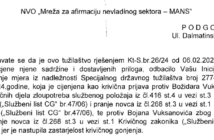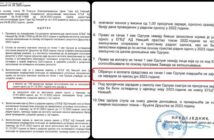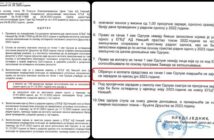“Hiding behind the institute of trade secret when it comes to spending citizens’ money is an absolutely unacceptable practice, and in the case of the Agency, it is a continuation of their contribution to the worsening results that the state has in the fight against corruption”, MANS stated.
The Agency for Prevention of Corruption restricted the Network for Affirmation of NGO (MANS) from access to loan repayment documents for improving housing conditions in 2018, when 10 officials shared € 70.000.
The decision to restrict access to documents was signed by the Acting Director Savo Milašinović, who declared the granting of favourable and privileged loans to Agency officials a “trade secret”.
Savo Milašinović
MANS, as well as the Montenegrin public, are denied the names of nine officials who met the Agency’s ad requirements, while information on the tenth official exist – Milašinović also received the loan and duly reported it in extraordinary assets and income statement.
MANS announced that they would appeal the decision.
“We believe that it is completely unacceptable for the institution that should be a synonym for transparency, to try to hide the way it spent taxpayers’ money in this way. This behaviour of the Agency, as well as of other state institutions when it comes to the implementation of the Law on Free Access to Information, was specifically criticized in the latest report of the European Commission”, MANS told Vijesti.
The document states that “what is concerning is the prevailing practice of state institutions to withhold from the public information which by its nature should be public”.
“Vijesti” have previously reported about the loans granted at that institution, and the Agency then said that the loans were given to the Assistant Director, five heads of sectors and one head of a department, but also to three officials – independent advisors, without specifying their names.
At the end of January, MANS asked the Agency for documentation on the basis of which decisions were made on who and under what conditions received the loan in 2018, and Milašinović informed them that their request was denied and that information on spending that part of the budget was in fact a trade secret.
The reasoning of the decision, into which Vijesti had an insight, states that, given that the requested information relates to loan funds deposited with commercial banks into the accounts of natural persons who are beneficiaries of those funds, “it is clear that the requested information is a trade secret” under the Law on Banks, which stipulates that the banking secret is considered to be information on turnover in individual accounts of legal and natural persons opened with the bank, and that banking secret is a trade secret.
The document adds that according to the above, the legal basis for restricting access to the requested information was acquired, if the information is trade or tax secret in accordance with the law.
They also added that the Agency had conducted a harm test of publishing the requested information. The Agency said they found that disclosing the requested information would “jeopardize interest in such way that, by publishing the requested information, the first-instance authority would violate the said provisions of the Law on Banks, and other provisions governing the confidentiality of banking transactions – the Law on Payment Transactions, the Law on the Central Bank and the Law on Banks.
“Violation of these provisions would cause damage to the trust in the work of the first-instance body since, as the state institution, it is obliged to act in accordance with the Constitution and law, and not contrary to them. Taking into account all the stated facts in the reasoning of this decision, in the present case it is not evident that there is a prevailing interest prescribed by Article 17 of the Law on Free Access to Information”, the document states.
MANS says that such decisions only add to the decreasing trust in the work of one of the key institutions in Montenegro’s EU accession process.
“Hiding behind the institute of trade secret when it comes to spending citizens’ money is an absolutely unacceptable practice, and in the case of the Agency, it is a continuation of their contribution to the worsening results that the state has in the fight against corruption”, the NGO concluded.
Out of the 1.300 salary, Milašinović’s loan instalment is €118
The Acting Agency Director Savo Milašinović received a housing loan at the end of 2018.
According to a property file that records an increase in assets worth more than €5.000, Milašinović reported receiving €7.000, which he repays in instalments of little less than €118.
As assistant director, his salary at the time was €1.300.
Last week, Milašinović did not receive the support of the members of the Agency Council to succeed Sreten Radonjić as director.
Milašinović signed several controversial decisions criticized by the EC in its reports on Montenegro.
It is also interesting that the Acting Director has so far not given the Agency approval to access bank accounts.
Since the forming of the Agency, he has four times increased the value of assets over €5.000, and these include, apart from loans and savings, purchase of vehicles, inheriting of money and real estate.
Moreover, the reasoning of the Agency’s decision states that the then director Sreten Radonjić did not apply for the housing loan awarded by the Agency.
“The director of the first-instance authority did not apply to the advertisement,” the statement said.
Radonjić previously received €40.000 of loan under favourable terms from the Government’s Housing Commission in January 2018. It is still unknown what is the amount of the loan instalment paid by Radonjić.
Source: ID Vijest




